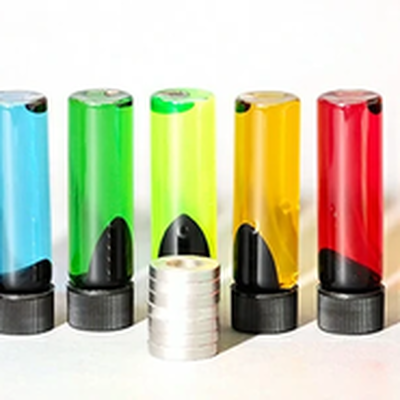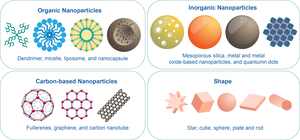NIST Traceable Polystyrene Particle Size Standards
Posted By Richard Gray
Body
With years of experience in the pharmaceutical and life science sectors, CD Bioparticles is pleased to announce the launch of its new NIST traceable Polystyrene Particle Size Standards in a variety of surface materials for research and commercial applications, including drug delivery, calibration and validation of particle size measuring instruments, diagnostics, immunoassays and flow cytometry.
One of the most critical aspects of particle sizing is the use of particle size standards. The National Institute of Standards and Technology (NIST) Traceable Particle Size Standards provide the accurate, traceable particle size calibration tools required for particle size analysis. These standards are a series of calibration particles with average diameters ranging from 40 nm to 1000 µm that are traceable to NIST standard reference materials.
CD Bioparticles has introduced a new line of polystyrene particle size standards, designed for biomedical research and bioassay development. These particles, with diameters ranging from 40 to 175 micrometers, are available as aqueous suspensions in 15 mL dropper bottles for convenient handling and dilution. For larger sizes, 200 to 1000 micrometers, dry pellets are offered. These particle size standards are precision engineered to ensure homogeneity and repeatability and are ideal for use in sizer calibration and validation, research, and a variety of industrial applications.
For example, DiagPoly™ Polystyrene/DVB Particles, NIST Standard, 1000 μm (Cat. No. DNT-TD1000) are suitable for use in performing routine instrument calibration checks and corrections. These NIST traceable size standards particles, composed of polystyrene crosslinked with divinylbenzene (PS/DVB), are meticulously measured on in-house instruments calibrated with NIST standard reference materials. With a size of 1000 μm, these dry powder particles provide a reliable and consistent reference for routine instrument checks.
Polystyrene particle size standards from CD Bioparticles are renowned for their exceptional properties. They exhibit high monodispersity, ensuring a uniform size distribution. Additionally, their consistent shape and reproducibility contribute to reliable and accurate measurements. Furthermore, these standards are highly stable and resistant to aggregation, maintaining their integrity over time. Their versatility allows them to be used in a wide range of applications, while their easy visualization and low toxicity with good biocompatibility make them suitable for biological and medical research, such as drug delivery, diagnostics, immunoassays and flow cytometry.
CD Bioparticles is committed to providing innovative and high-quality biomaterials to support scientific research and development. The new polystyrene particles size standards are a testament to the company's dedication to excellence and its ability to deliver cutting-edge solutions to the scientific community. For more information on how these new particles can enable scientists to conduct studies with greater precision, please visit https://www.cd-bioparticles.com/products/polystyrene-particles-size-standards-354.html.
About CD Bioparticles
CD Bioparticles is a leading manufacturer and supplier of various nanoparticles, microparticles, and coatings for R&D as well as commercialization across different application areas, including in vitro diagnostics, biochemistry, cellular analysis, cell separation, and immunoassay. The company also offers various custom services, including chemical surface-functionalization, fluorescent modification, antibody immobilization, as well as nucleic acid and oligo conjugation to meet client specifications.
One of the most critical aspects of particle sizing is the use of particle size standards. The National Institute of Standards and Technology (NIST) Traceable Particle Size Standards provide the accurate, traceable particle size calibration tools required for particle size analysis. These standards are a series of calibration particles with average diameters ranging from 40 nm to 1000 µm that are traceable to NIST standard reference materials.
CD Bioparticles has introduced a new line of polystyrene particle size standards, designed for biomedical research and bioassay development. These particles, with diameters ranging from 40 to 175 micrometers, are available as aqueous suspensions in 15 mL dropper bottles for convenient handling and dilution. For larger sizes, 200 to 1000 micrometers, dry pellets are offered. These particle size standards are precision engineered to ensure homogeneity and repeatability and are ideal for use in sizer calibration and validation, research, and a variety of industrial applications.
For example, DiagPoly™ Polystyrene/DVB Particles, NIST Standard, 1000 μm (Cat. No. DNT-TD1000) are suitable for use in performing routine instrument calibration checks and corrections. These NIST traceable size standards particles, composed of polystyrene crosslinked with divinylbenzene (PS/DVB), are meticulously measured on in-house instruments calibrated with NIST standard reference materials. With a size of 1000 μm, these dry powder particles provide a reliable and consistent reference for routine instrument checks.
Polystyrene particle size standards from CD Bioparticles are renowned for their exceptional properties. They exhibit high monodispersity, ensuring a uniform size distribution. Additionally, their consistent shape and reproducibility contribute to reliable and accurate measurements. Furthermore, these standards are highly stable and resistant to aggregation, maintaining their integrity over time. Their versatility allows them to be used in a wide range of applications, while their easy visualization and low toxicity with good biocompatibility make them suitable for biological and medical research, such as drug delivery, diagnostics, immunoassays and flow cytometry.
CD Bioparticles is committed to providing innovative and high-quality biomaterials to support scientific research and development. The new polystyrene particles size standards are a testament to the company's dedication to excellence and its ability to deliver cutting-edge solutions to the scientific community. For more information on how these new particles can enable scientists to conduct studies with greater precision, please visit https://www.cd-bioparticles.com/products/polystyrene-particles-size-standards-354.html.
About CD Bioparticles
CD Bioparticles is a leading manufacturer and supplier of various nanoparticles, microparticles, and coatings for R&D as well as commercialization across different application areas, including in vitro diagnostics, biochemistry, cellular analysis, cell separation, and immunoassay. The company also offers various custom services, including chemical surface-functionalization, fluorescent modification, antibody immobilization, as well as nucleic acid and oligo conjugation to meet client specifications.











Comments